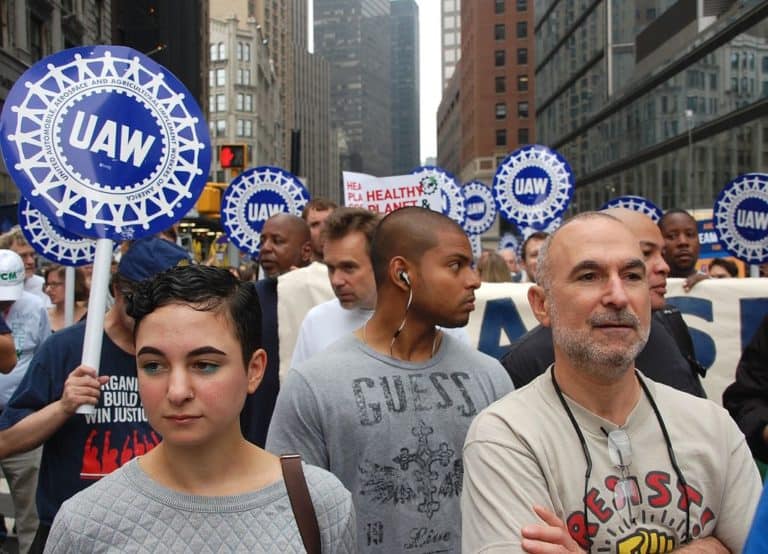
Tascha Shahriari-Parsa is a government lawyer enforcing workers’ rights laws. He clerked on the Supreme Court of California after graduating from Harvard Law School in 2024. His writing on this blog reflects his personal views only.
The reintroduction and passing of the Protecting the Right to Organize (PRO) Act in the House last month offers some first steps on a path to reversing the dwindling power of unions in the U.S., and with it the growing economic and political inequality that the decades of decline in worker power has precipitated. One of the ways in which the PRO Act would level the playing field for labor is through its provision mandating First Contract Arbitration (FCA). So what is FCA and why should we be interested?
Currently, when an employer and a union are unable to reach an agreement during collective bargaining, three things can happen: the union goes on strike, the employer locks out the employees, or the union is left without a contract. But there is also a fourth option: under an alternative system of interest arbitration, an arbitrator steps in, hears from the union and the employer, and then decides on the terms of a binding Collective Bargaining Agreement (CBA) between them.
The PRO Act would amend the NLRA to include a mechanism for First Contract Arbitration (FCA): a limited form of interest arbitration that applies only to first contracts. After a new union is certified, the PRO Act would require employers to begin collective bargaining within 10 days of receiving a written request from the union. From there, both sides have 90 days to reach an agreement, after which either the union or employer could request mediation by the Federal Mediation and Conciliation Service; if mediation fails, then an arbitration panel would resolve the matter. The arbitration panel would have three members: one selected by the union, one selected by the employer, and one agreed upon by both. The arbitrated contract would last 2 years, after which any subsequent collective bargaining would follow usual procedures.
How does an arbitrator decide what goes into the contract? Under the PRO Act, the arbitrator is instructed to determine contracts with an eye to the relative characteristics of the business, employee conditions, and comparative standards at other workplaces in the industry. Notably, considerations of union strength (such as strike readiness) which normally play a key role in determining the outcome of negotiations are absent from these criteria.
The Clean Slate for Worker Power supports the PRO Act’s FCA provision, and also calls for a broader system of interest arbitration whereby unions could request mediation and arbitration during bargaining to resolve standstills with management on any issue.
Such a system of interest arbitration wouldn’t be entirely new, though its permanent use across the entire labor force would be. In the U.S., interest arbitration experienced its peak during the Second World War, when it was employed under the War Labor Board to curtail strike activity by offering union workers with a less disruptive mechanism for resolving standstills in labor-management negotiations. With a similar objective, starting in the 1960s, interest arbitration has been codified by some state or local governments in the U.S. and provincial governments in Canada as the final step in resolving impasse for limited strata of public sector workers where there is a special concern that strikes could disrupt vital services (for example, firefighters).
Where it has been implemented in Canada, interest bargaining has reduced strikes by over 50%. Yet it would be a mistake to see the curtailing of strikes as the only reason justifying its implementation.
Why Should We Be Interested?
Interest arbitration, including FCA, offers many clear benefits to the labor movement. The most obvious of these is encouraging collective bargaining. Where interest arbitration has been implemented, arbitration itself is rarely used; instead, the threat of arbitration tends to pressure both parties to reach an agreement on their own. Under our current system—where the NLRB lacks the power to compel employers to agree to a CBA and where even the “adamant insistence” of an “inherently unreasonable” bargaining position can still constitute good faith under the NLRA—employers may have strong incentives to refuse to negotiate. Even a credible strike threat may be insufficient to change that in today’s economy, as an employer will often decide that the costs associated with a refusal to bargain are less than the costs of signing onto any CBA. It thus shouldn’t come as a surprise that between 1996 and 2004, over 40% of initial contract negotiations in the private sector closed without agreement after 2 years. FCA, especially under the automatic access model, has the potential to effectively bring that percentage down to zero.
Even before the collective bargaining stage, FCA can make organizing a union less daunting. If an employer states that it will never agree to any of the union’s demands, an organizer can respond: “They don’t have to agree! An arbitrator will compel them to.” Perhaps most crucially, workers can win without going on strike, avoiding both the risk of permanent replacement and the forfeiture of their wages for the duration of the work stoppage. FCA thus has the effect of removing barriers to organizing and increasing workers’ optimism about winning, which itself can help build the critical mass necessary for unionization efforts. As slogans like “Marriot, Marriot, you’re no good, sign a contract like you should” come to enjoy the law’s approval, FCA can also encourage union organizing by signaling the law’s support for, rather than neutrality towards, collective bargaining efforts.
Some Canadian studies have shown that the outcomes of bargaining may also be different: under interest arbitration, union workers end up with modestly higher wages than under other collective bargaining regimes—and those wages are not significantly different whether a given CBA is negotiated or arbitrated. Whether this extends to FCA is unclear. Some have attributed the wage premium associated with interest bargaining regimes to a so-called “ratchet” effect where arbitrator awards are higher than expected because of “repeated cycles of interest arbitration in which an arbitrator is reluctant ever to impose a concession on labor.” Because such repeat cycles of interest arbitration would not take place under FCA, the ratchet effect may not obtain.
The Canadian experience with interest bargaining offers promise for the benefits of the PRO Act’s FCA provisions. It also supports Clean Slate’s proposal for a broader system of interest arbitration to resolve impasses in negotiations by demonstrating that such a system is likely to afford workers with greater bargaining power, discouraging employer recalcitrance through the background threat of arbitration without fully replacing the existing collective bargaining process.
At the same time, a broad system of interest arbitration necessarily raises further questions that the Canadian experience cannot fully answer. If interest arbitration reduces the need for strikes, what will happen to the future of labor militancy? Would such a system create excessive reliance on arbitrators, reducing labor’s power in the long-run? Or will it merely substitute a very burdensome form of leverage, the withholding of labor, with another that is more peaceful and reliable?
Regardless of our answers to these questions, our vision in the interim must be clear: passing the PRO Act and giving workers a foot in the door with First Contract Arbitration is a necessary and substantial step towards addressing the stark imbalance of power between labor and capital.










Daily News & Commentary
Start your day with our roundup of the latest labor developments. See all
February 17
San Francisco teachers’ strike ends; EEOC releases new guidance on telework; NFL must litigate discrimination and retaliation claims.
February 16
BLS releases jobs data; ILO hosts conference on child labor.
February 15
The Office of Personnel Management directs federal agencies to terminate their collective bargaining agreements, and Indian farmworkers engage in a one-day strike to protest a trade deal with the United States.
February 13
Sex workers in Nevada fight to become the nation’s first to unionize; industry groups push NLRB to establish a more business-friendly test for independent contractor status; and UFCW launches an anti-AI price setting in grocery store campaign.
February 12
Teamsters sue UPS over buyout program; flight attendants and pilots call for leadership change at American Airlines; and Argentina considers major labor reforms despite forceful opposition.
February 11
Hollywood begins negotiations for a new labor agreement with writers and actors; the EEOC launches an investigation into Nike’s DEI programs and potential discrimination against white workers; and Mayor Mamdani circulates a memo regarding the city’s Economic Development Corporation.